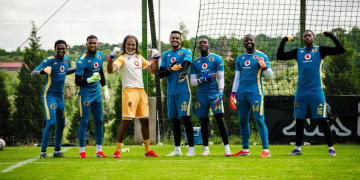
Discover how football is a powerful tool for empowering African youth, driving community development, and creating opportunities across the continent.
Football’s Role in Empowering African Youth and Fostering Community Development
Football, or soccer as it is known in some parts of the world, holds a unique position in Africa. It’s not just a sport; it’s a cultural phenomenon that transcends borders, languages, and social classes. With the continent’s rich history and passion for the game, football has become a powerful vehicle for youth empowerment and community development. As the beautiful game continues to flourish in Africa, its role in shaping the lives of young people and fostering community cohesion cannot be overstated. Follow all today soccer results and keep an eye on yesterday match result to be in touch with all of Africa’s football news.
The Power of Football in Youth Empowerment
Football transcends borders and cultures, uniting people from all walks of life. It offers young Africans a transformative platform to express themselves, develop essential life skills, and pursue dreams that extend far beyond the pitch. The sport provides a structured environment where youth can learn discipline, teamwork, leadership, and perseverance—qualities that are invaluable in all areas of life.
In regions plagued by poverty and limited opportunities, football provides a beacon of hope for many African youth. It’s more than just a sport; it’s a pathway to a better life. Talented young players often view the sport as a ticket to a better life, whether through professional careers or scholarships that open doors to education and new opportunities.
Football Academies: Nurturing Talent and Building Futures
The rise of football academies across Africa has been instrumental in the continent’s development of young talent. These academies, more than just honing football skills, provide young players with education, mentorship, and a sense of community. Institutions like the Right to Dream Academy in Ghana and the Aspire Academy in Senegal have produced world-class players who have made significant impacts on and off the field.
These academies play a crucial role in community development by creating jobs, boosting local economies, and inspiring the next generation of players. They also emphasize the importance of education, ensuring that even if a football career doesn’t materialize, the youth have the knowledge and skills needed to succeed in other fields.
Football as a Tool for Social Change
Beyond individual empowerment, football is a powerful tool for social change across Africa. Football has proven to be a powerful force for positive change. Initiatives like FIFA’s Football for Hope program have harnessed the sport’s influence to address pressing social issues, promote peace, and foster unity.
In post-conflict regions, football has been used as a means of reconciliation, helping to heal divisions and foster unity. In Sierra Leone, for example, football played a pivotal role in bringing together communities torn apart by civil war. Through tournaments and leagues, former adversaries found common ground on the pitch, leading to dialogue and understanding off the field.
Intriguing Storylines: From Grassroots to Global Stars
One of the most inspiring aspects of African football is the journey from grassroots to global recognition. The stories of players who have risen from humble beginnings to international stardom are a testament to the sport’s transformative power. Players like Didier Drogba, Samuel Eto’o, and Sadio Mané have not only achieved success on the world stage but have also used their platforms to give back to their communities.
Drogba’s role in ending the civil war in Ivory Coast is a prime example of how footballers can be catalysts for change. His appeal for peace, delivered after a World Cup qualifying match, led to a ceasefire and, eventually, national reconciliation. Similarly, Eto’o’s philanthropic efforts in Cameroon and Mané’s contributions to healthcare and education in Senegal highlight the profound impact that football can have beyond the pitch.
The Future of Football in Africa
As African football continues to grow, so does its potential to empower youth and drive community development. The increasing investment in football infrastructure, coupled with the rise of women’s football and the success of African teams on the international stage, signals a bright and hopeful future for the sport on the continent.
However, challenges remain. Corruption, lack of resources, and political instability are ongoing issues that hinder the full realization of football’s potential in Africa. Overcoming these challenges requires a concerted and engaged effort from governments, organizations, and the football community itself.
In conclusion, football in Africa is much more than a game; it is a powerful force for empowerment and development. By providing opportunities, fostering community cohesion, and serving as a social change platform, football plays a vital role in shaping the future of African youth and communities. As the sport evolves, its impact on the continent will only grow, offering hope and inspiration to millions.









